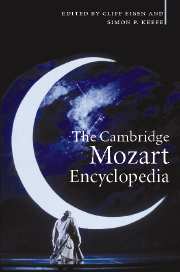Book contents
- Frontmatter
- Contents
- Contributors
- Preface
- A–Z general entries
- A
- B
- C
- D
- E
- F
- G
- H
- I
- J
- K
- L
- M
- N
- O
- P
- R
- S
- T
- U
- V
- W
- Z
- Appendix 1 Worklist
- Appendix 2 Mozart movies (theatrical releases)
- Appendix 3 Mozart operas on DVD and video
- Appendix 4 Mozart organizations
- Appendix 5 Mozart websites
- Index of Mozarts works by Köchel number
- Index of Mozarts works by genre
- General index
B
from A–Z general entries
Published online by Cambridge University Press: 05 June 2012
- Frontmatter
- Contents
- Contributors
- Preface
- A–Z general entries
- A
- B
- C
- D
- E
- F
- G
- H
- I
- J
- K
- L
- M
- N
- O
- P
- R
- S
- T
- U
- V
- W
- Z
- Appendix 1 Worklist
- Appendix 2 Mozart movies (theatrical releases)
- Appendix 3 Mozart operas on DVD and video
- Appendix 4 Mozart organizations
- Appendix 5 Mozart websites
- Index of Mozarts works by Köchel number
- Index of Mozarts works by genre
- General index
Summary
Bach, Carl Philipp Emanuel (b. Weimar, 8 Mar. 1714; d. Hamburg, 14 Dec. 1788). German composer; son of J. S. Bach. Carl Philipp Emanuel Bach received his musical training from his father and from about the age of fifteen took part in performances at the Leipzig Thomaskirche and by the local collegium musicum. He studied law at the Leipzig University but in 1734 moved to Frankfurt an der Oder, where he continued his studies and was musically active, performing works by his father as well as his own. In 1738 he was appointed to the court of Frederick of Prussia: his duties chiefly included composing and teaching, which may have inspired his Versuch über die wahre Art das Clavier zu spielen (Berlin, 1753), the most important eighteenth-century German-language treatise on the subject. Bach was under-appreciated in Berlin (the court was also home to Hasse, Graun, Quantz and Agricola) and he sought appointments elsewhere although his applications for the post of cantor at the Leipzig Thomaskirche of 1750 and 1755 failed, as did a 1753 application for the post of organist at the Johanniskirche in Zittau. But he was successful in his application to succeed Telemann as music director of the principal churches in Hamburg in 1767, moving there the next year. His duties included teaching at the Lateinschule and organizing music at the city's five principal churches, which amounted to nearly two hundred musical performances a year.
- Type
- Chapter
- Information
- The Cambridge Mozart Encyclopedia , pp. 35 - 56Publisher: Cambridge University PressPrint publication year: 2006

